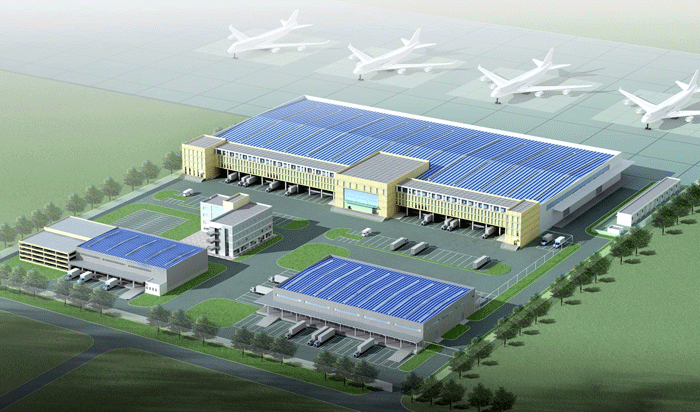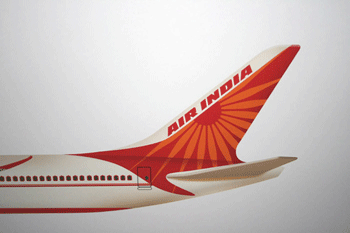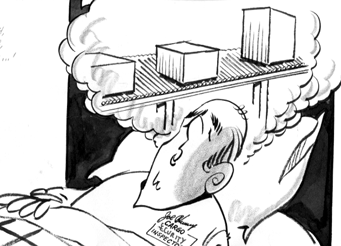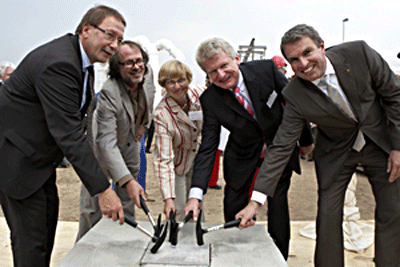Vol.
7 No. 70 WE
COVER THE WORLD
Thursday
July 3 ,
2008
 |
Tianjin's Olympic Attraction

Tianjin Airport Hua Yu Air Cargo Terminal
|
The recent opening of Tianjin
Binhai Airport, one of the primary alternate airports for the Beijing
Olympics is just in time for the big event, now just a few days over a
month away.
The new terminal, as the
major part of the airport’s expansion project to cater to the needs
of the coming Olympic Games, is five times larger than the old one, with
the annual capability of handling 10 million passengers and 500, 000 tons
of cargo.
The expansion includes a total investment
of nearly RMB3 billion (USD429.5 million), starting in August 2005, including
a new 116,000-square-meter terminal building, a 270,000-square-meter apron
and a 62,000-square-meter parking lot.
After the opening of the new terminal, the
old one, together with other areas west of the airport’s runway
will form the logistics zone of the airport, serving strictly air cargo.
As part of the airport’s achievements
in developing itself into North China’s cargo hub, Tianjin Airport
currently operates four cargo terminals, operated by Air China, Tianjin
Airport Cargo Terminal (TCS), Sinotrans-Korean Air joint-venture, and
Tianjin Airport Hua Yu Air Cargo Terminal.
Hua Yu Air Cargo Terminal is a joint venture
of Lufthansa Cargo, Taiwan’s Hwa Hsia International Holding and
Tianjin Airport International Logistics Joint Stock Company.
 During
an interview with Ulrich Huesson, Managing Director of Hua Yu Air Cargo
Terminal, Air Cargo News FlyingTypers was told: During
an interview with Ulrich Huesson, Managing Director of Hua Yu Air Cargo
Terminal, Air Cargo News FlyingTypers was told:
“Jade Cargo and Lufthansa Cargo, set
up early contracts with us.”
Responding to the possible competition among
these cargo terminals, Mr. Ulrich Huesson said:
“Yes, we are also aware of the competitive
situation at Tianjin airport. However we believe that this can also have
a positive effect for the airport development and for our business.
“Airlines are attracted by Tianjin
airport and competition gives us the challenge to become better every
day!
“The tremendous development forecast
for Tianjin and the Bin Hai New Area will provide enough potential for
all the terminals at the airport!”
Jade Cargo by the way landed at Tianjin
Binhai International Airport April 14.
Favored by the rapid development of Binhai
New Area, in which Airbus's first overseas assembly plant is located,
Tianjin Binhai International Airport is expected to become more and more
attractive to both domestic and foreign carriers.
Recently the gateway has added more new
airlines launching their operations in Binhai Airport, including the Sino-Korean
joint-ventured Galaxy International Cargo Airlines, Sino-Singapore joint-ventured
Great Wall Airline and South China’s Xiamen Airlines, opening two
new international cargo routes and two international passenger flights.
David
 Fuel
Havoc Air India Fuel
Havoc Air India
Third time unlucky must be what
Air India's freighter service project is suffering from.
The freighter service was initially
planned for a March 2007 launch.
It was postponed to November 2007,
by which time it had been expected that new passenger planes on
order would be ready to put into service thereby releasing some
of the old ones that could be used for cargo.
When that did not happen, the launch
was scheduled for July 1, 2008.
Well, say hello to our summer friend
called July and guess what?
There are no AI freighters in sight!
This time, however, it is mounting
losses as fuel costs have absolutely skyrocketed that are being
felt as putting the brakes on the new venture.
Now with the AI freighter indefinite
postponement, the hype that had been created about the fortunes
at Nagpur's Dr. Ambedkar International Airport becoming first a
domestic hub and later an international one, has vanished.
The Air India Cargo freighter project
had the potential to place Nagpur on the global aviation map much
ahead of the Multimodal International Hub Airport at Nagpur (MIHAN).
Dismissing reports that there would
be delays in the conversion of four B-737s by Air India, sources
at the Mumbai headquarters pointed out that the carrier had in fact
completed the conversion process.
The aircraft may indeed be ready to
fly but the question that continues to beg an answer is–when?
Tirthankar Ghosh
|
Taking
A Bite Out Of Cargo Fraud
Later this year comes
the fourth IATA Cargo Loss & Claims Conference (CC&L)
September 17-September 19, 2008 in Bangkok, Thailand at Royal
Orchid Sheraton Hotel & Towers.
In an era of runaway fuel and slimming
margins, loss control due to claims or theft or simple lack of
information and procedures to properly analyze and determine shipper
claims, is taking on a separate and growing importance.
The IATA CC&L initiative brings
together some of the best and brightest experts for a couple of
days of meetings, presentations and brainstorming around a common
challenge.
Jeff Hinton is a Singapore-based
Senior Liability Claims Adjuster at Charles Taylor Adjusting Ltd,
a UK company that used to be called Lloyds Aviation Department.
Here Mr. Hinton tackles the challenges
of loss prevention in air cargo head on.
“The majority of air freight
transported comprises of specialist machinery (especially electronic
goods including computer ware) telecommunications equipment, medical
and pharmaceutical products, textiles, food stuff, perishables
and photographic equipment.
Fraud By Numbers
“In weight
terms the largest export commodity is miscellaneous (15%) and
other electrical machinery (15%).
“For imports the most important
categories by weight are fruit and vegetables (13%), photographic
equipment (11%), travel goods (8%), telecommunications and audio
equipment (9%), office machinery (5%), general industry machinery
(10%) and metal working machinery (5%).
“Clearly the wide diversity
of goods handled by air cargo exposes the industry to potential
problems and fraudulent claims.
 “The
impact of fraud can be very significant in terms of monetary value
and to the operation and reputation of the air cargo company. “The
impact of fraud can be very significant in terms of monetary value
and to the operation and reputation of the air cargo company.
“Fraud can be perpetrated
both internally and externally so it is important to focus on
the problem and identify and try to mitigate fraud risks.
“On average it is estimated
that airlines lose at least USD$3,000.000.00 each in fraud a year.
“When it comes to the problem
of internal fraud, cargo theft is still regarded as one of the
most costly to the airline.
“Cargo theft still remains
a problem especially with the high increase in the amount of electrical
components often transiting from the Far East which, unfortunately
are quite easily identifiable by those perpetrators despite packaging
methods often used by shippers to try to disguise the identity
of the consignment being transported.
“There are still quite a large
proportion of airlines that have no fraud policy.
“A lot of the airlines have
no anti fraud program, no “whistle blowing” mechanism
that would allow staff to report any known or seen fraud.
“There are important factors
that air cargo companies need to look at and that is a system
to track fraud and perform a risk assessment to govern a problem
that can work out to be expensive.
“There is a growing consensus
that the level of fraud is going to increase rather than decrease.
“In a recent survey that was
performed by Deloitte some airlines were asked how they discovered
fraud.
“Amazingly up to 31% of the
airlines only discovered fraud by accident!
“We at Charles Taylor Adjusting
have become involved in a number of investigations of fraudulent
claims, the most common of which appears to have been notification
of damage occurring prior to the custody and control of the airline
and/or their handling agent, the loss of goods notified after
delivery to the eventual consignee and lastly the collection of
goods against fraudulent documentation.
“Indeed Charles Taylor were
involved in a detailed investigation concerning the collection
of goods in London against a banker’s order/draft later
to be discovered as a fraudulent document.
“We liaised with the Police
Authorities where enquiries revealed a “trend” and
the emergence of a gang perpetrating this and many other similar
losses.
“Charles Taylor has also been
part of detailed and often high profile loss situations including
thefts and armed robberies that unfortunately sometimes are attributable
to “employee interaction” where they are indirectly
involved in incidents.
“Examples of that are the
armed robbery awhile back at London Heathrow, or the well publicized
theft of currencies and diamonds at Brussels International Airport.
“Unfortunately the trend going
forward is not good and whilst preventative measures can be put
in place they are never going to totally eradicate the problem.
“But there are things everyone
can do to minimalize loss damage.
“As example early investigation
of a suspected claim including the analyzing of documentation
and the interview of people is essential together with the utilization
of survey of goods/consignment where applicable. “Also the
implementation of an anti fraud program whereby fraud risks must
be assessed regularly and a proven scheme implemented such as
an early warning detecting systems and “whistle blowing”/”speak
up” mechanism so that anyone who suspects fraud knows how
to speak up and where to go.”
Geoffrey
|

 What
is happening here? What
is happening here?
Could this be a picture taken just
as a bar of Ivory Soap marketed in USA as “The Soap That Floats,”
finally sank?
Actually Lufthansa Cargo laid the
foundation stone for a new freight center in CargoCity South at
Frankfurt Airport and several people with a hand in that energetic
enterprise lent themselves in kind for the photo op.
Pictured from left to right: Hessian
Minister of Finance Karlheinz Weimar, Investor Ardi Goldman, Frankfurts
town councillor Dr. Renate Sterzel, Dr. Wilhelm Bender, CEO of Fraport
AG and Carsten Spohr, CEO of Lufthansa Cargo.
The new Lufthansa Cargo Service Center
scheduled to debut around Oktoberfest 2009, will appear near the
"Lufthansa Cargo Center" in CargoCity North.
The new handling facility will be
utilized for mail shipments from medium-sized forwarders and partner
airlines. Simultaneously, the Service Center will accommodate the
German and the European sales organizations of Lufthansa Cargo that
will move on airport from Kelsterbach a little corporate town located
just off airport.
|

 Universal
Freight Organization in England, received it’s ISO 9001:2000
Quality Management Systems Certificate making the international
forwarder organization one of the first freight networks in the
world to receive the accreditation. and Rachel Humphrey, chairwoman
of UFO, couldn’t be happier. “I feel very honored to
be one of the world’s first freight networks to receive ISO’s
prestigious accreditation. Universal
Freight Organization in England, received it’s ISO 9001:2000
Quality Management Systems Certificate making the international
forwarder organization one of the first freight networks in the
world to receive the accreditation. and Rachel Humphrey, chairwoman
of UFO, couldn’t be happier. “I feel very honored to
be one of the world’s first freight networks to receive ISO’s
prestigious accreditation.
“Quality excellence is a constant
goal at the UFO head office and receiving the ISO for our quality
management system assures us that we are not only doing a good job
but creating a standard that will be recognized by our member companies,
airlines, shipping lines, freight forwarders, manufacturers, importers
and exporters around the world.” |
|



